Come From Away
These seven international students and alumni are among the thousands who contribute to scholarly and cultural life at U of T
Like many international students, Dhanya Dass finds it easy to talk about how she has benefited from studying at the University of Toronto. “U of T has given me so much,” says the third-year student at U of T Mississauga – “new opportunities, new friends and a new creative outlet.”
In turn, the university community has also benefited from Dass’s presence – and from the presence of more than 20,000 other students from around the world who live, work and study across the three campuses. But what are these benefits, exactly?
It’s a question to which Joseph Wong, U of T’s vice president, international, has given a lot of thought. For one, he says, Canadian students learn side-by-side with peers who often have direct knowledge of a topic. “It’s one thing to read about nationalist movements in Europe or South Asia,” he notes. “It’s an entirely different learning experience when you can talk to – and learn from – your peers who are from these regions.”
This advantage extends beyond the classroom into co-curricular experiences and conversations in residence, he says, adding up to an immeasurable impact on life at the university. “All U of T students gain a tremendous opportunity not only to be prepared academically for the world of work but also to be prepared socially and culturally for the literal ‘world of work,’” he says.
To continue to attract top global students, the university, in recent years, has significantly expanded the number – and value – of international scholarships. It has also created a $3-million International Student Experience Fund. “It’s not just a commitment to getting international students through our door,” says Wong. “It’s to ensure that they are in a position to succeed while they’re here.”
The Connector
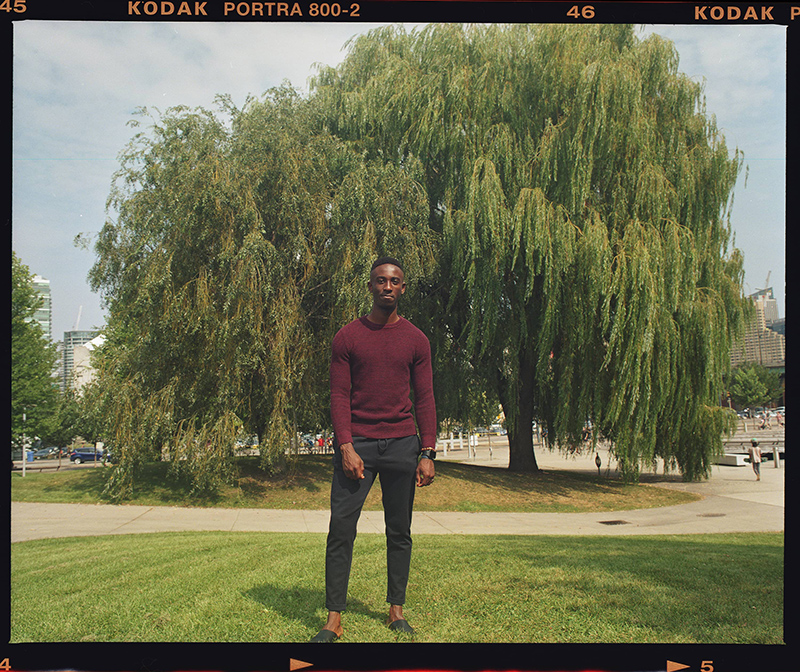
Ernest Nyarko
Hometown: Accra, Ghana
Five years ago, Ernest Nyarko and his friend Efosa Obano (both BBA 2018 UTSC) teamed up with other U of T undergrads to create the African Impact Initiative, a non-profit organization open to all students. Their objective: to help solve some of the problems faced by communities in Africa.
Since then, the initiative’s volunteers have been collaborating with young people from Africa to contribute to the continent’s development through community work, mentorship and entrepreneurship. One of the group’s first activities was to fund a small project to improve health-care outcomes in the village of Ikot Eko Ebon in southeastern Nigeria.
In co-founding the initiative, Nyarko demonstrated that international students do much more than just study at U of T – their global experiences help their Canadian peers understand the world better. “Diversity gives us the tools to challenge preconceptions and imagine the principles that will shape a better future,” says Nyarko, who came from Ghana to study in the co-op marketing and management program at U of T Scarborough, and now works as a management consultant at Deloitte in Toronto.
As part of his classes and extra-curricular activities, Nyarko was able to describe some of Ghana’s “non-Western realities” to his fellow students. “I made a point of sharing my experiences growing up,” he says – with the hope of giving his classmates information to question stereotypes about Africa. It’s just one example of how, by hosting students from around the world, U of T helps all of its students become better global citizens, he says.
– Gilbert Ndikubwayezu
The Community Builder
Zarina Mamadbekova
Hometown: Khorog, Tajikistan

You studied political science. How did your international peers contribute to your learning experience?
In third year, I took South Asian politics. Most of the students were from Pakistan, Bangladesh and India. I did my readings, but I learned so much in that class because the discussions were so enriching. My classmates had firsthand knowledge of what we were studying and were very opinionated, especially on the partition of India. My own opinion of the political situation in South Asia, a place that was foreign to me, came from discussions in that class.
Were you able to share aspects of your culture with your classmates?
I realized quickly that most people know almost nothing about Tajikistan. Every person I met had questions. I felt like I was putting Tajikistan on the radar for them. During a cultural event at U of T Mississauga, I represented Pamir, the region where I’m from. And I gave some short presentations about Pamir in class – about the people, the food, the traditions and religious practices – that seemed to have an impact.
You were also part of a small, first-year seminar on global justice as part of the UTM One Scholars program. What was that like?
We talked about social, religious and political issues on a global scale. There was a lot of disagreement in that class. One of the biggest topics was cultural appropriation and cultural appreciation – and what these terms mean. I learned that different communities think about these issues in very different ways.
Are you still in touch with classmates from different countries?
Yes! One is from California; another is Spanish but lives in the Philippines; another is from B.C. I love travelling, and now, when I do, I’ll have a second home in many places.
Your work at U of T Mississauga relates to international students. How so?
I’ve been helping to develop a new program called the Global Living, Learning Community. First-year students from different countries, including Canada, will live together in residence. It’s one thing to talk about global citizenship, but it is something else to live in a community with people from so many different cultures. International issues will come up in daily life – and so will disagreements. They’ll have to figure out how to get past them.
– Scott Anderson
The Pianist
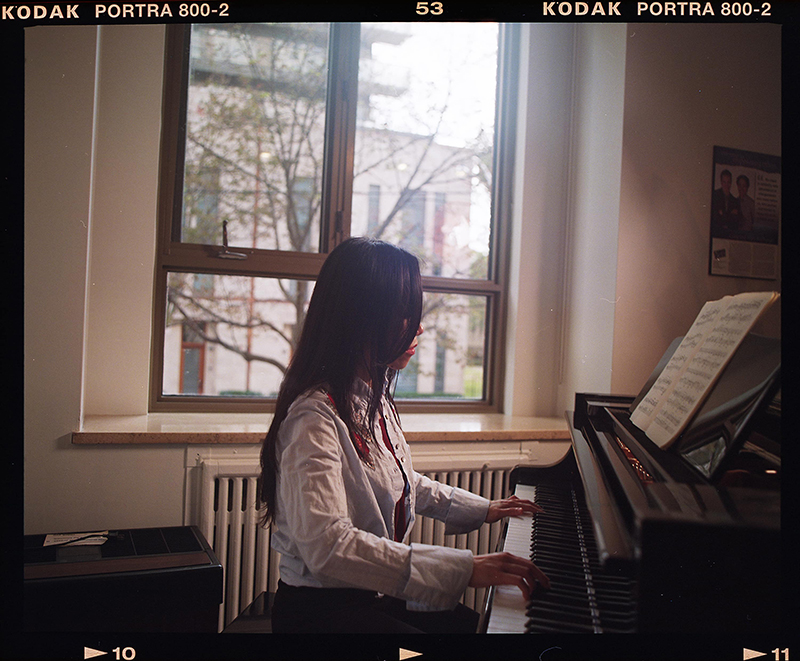
Jialiang Zhu
Hometown: Hainan Island, China
Jialiang Zhu loved attending concerts by visiting musicians when she was an undergraduate student in the Faculty of Music, but among the events that influenced her career, one stood out the most. “It was a concert by the Imani Winds quintet, and I was in awe of how connected they all were to each other,” says Zhu, a pianist. She vowed that she would play in a group like that one day.
Today, Zhu, who is pursuing a Doctor of Musical Arts degree at U of T, is also a member of the Bedford Trio – an ensemble with a growing international following. She co-founded the trio in 2015 with fellow U of T music alumni Alessia Disimino, a violinist, and Andrew Ascenzo, a cellist. “We shared a passion for chamber music but were also interested in works by contemporary composers, so it was a great fit,” she says.
As part of Zhu’s doctoral work, she would like to extend the reach of compositions from her homeland – specifically songs based on classical Chinese poetry. Many of the poems she’s studying were part of the public school curriculum in China, where she memorized them in Mandarin.
“Unlike many of my classmates, I loved reciting them because the language had unique tonal inflections that already sounded like music to me,” she says. “My goal is to expose English-speaking musicians and audiences to this wonderful poetry and the contemporary art songs inspired by it.” Zhu’s thesis offers practical tools for learning to understand the poetry, such as a Mandarin diction guide and recorded pronunciations.
Zhu has performed some of these songs in Canada and China and online with native Mandarin speakers and non-native speakers, including Chinese diaspora musicians and those from other cultures. “I’m grateful that my research and performance have connected me with contemporary artists from around the world,” she says. “I hope this will plant the seed for something that continues to grow.”
– Megan Easton
The Banker
Jose Ignacio Valdez
Hometown: Lima, Peru
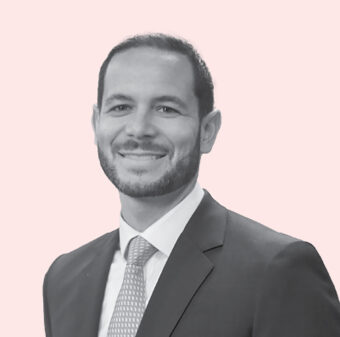
Jose Ignacio Valdez belonged to the Latin American business club when he was an MBA student at the Rotman School of Management, and he remembers talking to his fellow members about how strange the networking and recruitment events felt. “To us, it was very odd approaching people we’d never met to give them our elevator pitch and try to strike up an engaging conversation,” says Valdez, who completed his degree alongside his wife, Brenda Balcázar (both MBA 2010). They were accustomed to more formal practices, such as relying on referrals and applying to posted positions.
Valdez, who grew up in Peru, knew he would have to get over his discomfort with this cultural difference to have any chance at landing a job, especially since it was the height of the 2008-2009 recession. “You only get one shot at the best of times to make the right impression when a firm is recruiting,” he says. “Fortunately, a Rotman priority from day one is to ensure students understand how Canadian executives think and do business, both through classes and guest speakers.” He turned out to be one of the few in his class to land an investment banking internship, which evolved into a full-time job at a Canadian bank. After working there for several years, he returned to Peru as director of the country’s investment banking team for Scotiabank. Today Valdez is Scotiabank’s managing director, head of Latin America investment banking. “I feel like I have the best of both worlds,” he says. “I get to work for a Canadian company, but in the Latin American market.”
Being part of a diverse student body at Rotman not only assured Valdez he wasn’t alone in taking some time to acclimatize to a new business culture, but also prepared him for the challenges of working for one of Canada’s most international banks. “We learned to be sensitive to cultural differences, a skill that’s very helpful in my current day-to-day work interacting with clients and colleagues from Canada, the U.S. and across Latin America – which is culturally diverse in itself,” says Valdez. “The MBA program was a great training ground for the real world of international business.”
– Megan Easton
The Theatre Artist
Dhanya Dass
Hometown: Kuala Lumpur, Malaysia

What was your first impression of Canada?
I actually didn’t know what Canada was like before coming here, except that it was super cold. But after my arrival, I realized how much it felt like home. There was a really welcoming vibe.
How was your first year away from Malaysia?
Challenging – but rewarding because of that. I didn’t know where I was going to end up. I had juggled academics and the performing arts my whole life – and both were crucial to my happiness. But I struggled to find a new creative outlet at U of T Mississauga. What kept me strong was the friendships I developed. The friends I made are like family to me now.
Did you get the chance to talk to your fellow students about Malaysian culture?
Yes, I had roommates from India, Zimbabwe and Canada. One thing people find hard to grasp is I’m ethnically Indian but from Malaysia. I don’t say I’m Indian because I’ve never been to India. We practise some of the same traditions but I come from a very different culture overall. I am proud of my Indian heritage and proud to be Malaysian. I think it helps for people to understand these nuances. For my part, it’s interesting to hear someone who grew up in Zimbabwe talk about how her experience as a Black person there is different from her experience as a Black person in Canada.
You worked for a Hart House Theatre show as an assistant director. Why was that meaningful for you?
I finally found my creative outlet! For a while, I would come home at midnight or 1 a.m. almost every day and have to get to 9 a.m. classes the following morning. I did it because it’s my passion. I need to be around creative people. And I was appreciative of how much effort Hart House Theatre puts into recognizing that each individual has something unique to contribute.
Something must have clicked for you to continue with the theatre as a work-study student…
I applied for the program thinking I would help with staging and promoting shows, but because of COVID, everything went online. I organized virtual workshops. One of my proudest moments was conducting a workshop with the musical director of Hamilton. We also staged an interactive theatrical piece about the rise of domestic violence during the pandemic.
What’s next for you?
I’d like to combine my studies in behavioural economics with my interest in inclusivity and my passion for the arts.
– Rebecca Gao
The Mental Health Advocate
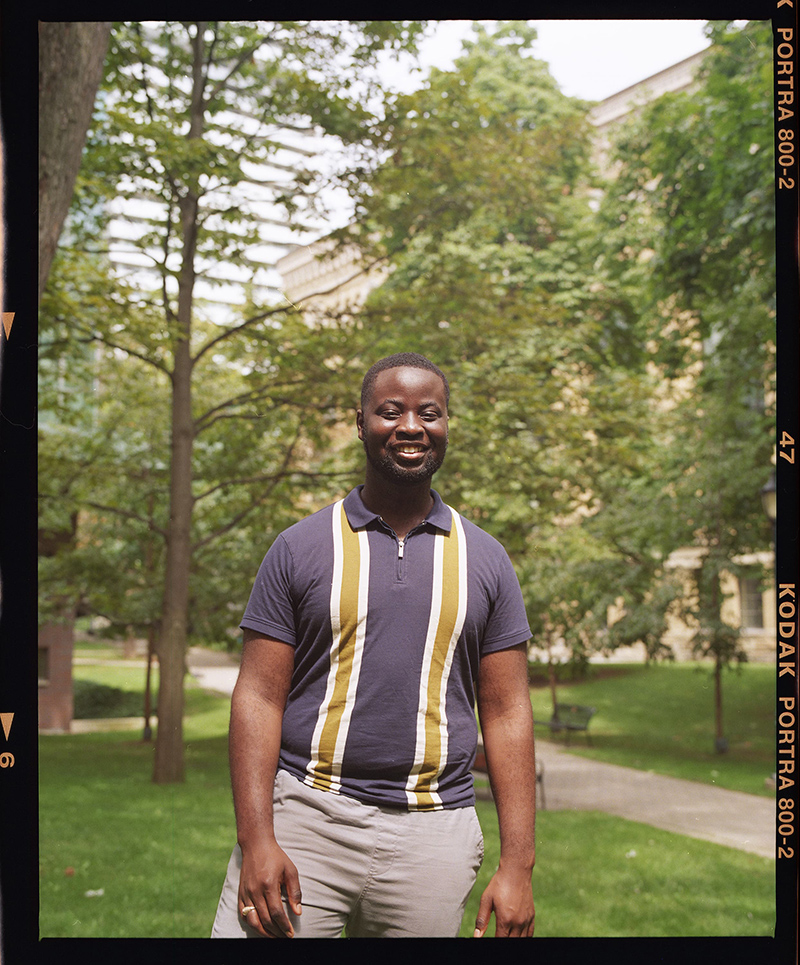
Suddene Stone
Hometown: Central Village, Jamaica
It wasn’t until public health regulations required an end to in-person classes partway through Suddene Stone’s first year at U of T Scarborough that he truly understood how globally diverse his new classmates were. “When the pandemic hit, and people went home, I suddenly had friends in many different time zones,” he says.
For Stone, who is in the third year of a psychology degree, moving to multicultural Toronto from his native Jamaica expanded his worldview in ways he didn’t expect. It hasn’t been just about trying new foods. He has been able to observe – and compare – social, cultural and religious customs from Turkey, India and Egypt, to name just a few countries his classmates are from. “You learn how to interact with different people across different cultures,” he says.
Community work is important to Stone, who attends U of T on a Pearson Scholarship (awarded to international students who demonstrate exceptional academic achievement, creativity and leadership qualities). In Jamaica, he often spent weekends in a student-led service club, helping to plant trees, for example, or paint schools. In his first semester at U of T Scarborough, he joined the Imani Academic Mentorship Program to volunteer as a tutor for local Black youth, to encourage them to consider higher education. Although eager to help, he didn’t understand at first why such a program was needed in Canada.
He soon heard firsthand from his mentees about racism in the Canadian education system, including high expulsion rates and discrimination from teachers. “Even in middle school, they understand that much more work needs to be done in Canadian society to achieve racial equity, especially for students.”
With respect to his own studies, Stone plans to complete a master’s and PhD in clinical psychology, and aims to gain practical experience in the field while in Canada. “People who are seriously mentally ill often go undiagnosed or don’t have access to proper care,” he says. “I want to help change that.”
– Matthew DiMera
The Computer Scientist
Mahak Khurmi
Hometown: Sri Ganganagar, India
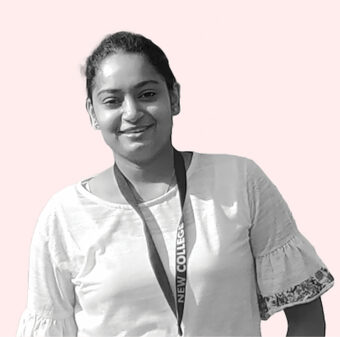
Everyone knows that for mathematicians “show your work” is an important rule. So when Mahak Khurmi, who is majoring in computer science and statistics, talks about her success, she is eager to describe the problems she had to solve on the way there.
Dreading math at the beginning of high school, she attacked the subject with a tutor – and finished high school in the top one-tenth of one per cent of math students in India. It’s no surprise, then, that she tackled her first challenge as a U of T student in the fall of 2019 with similar fervour.
“When I came to Canada, I was very homesick,” says Khurmi, who grew up in a small city in northwest India, and is the first in her immediate family to attend university. “One thing that helped me was reaching out when I was in trouble.” She joined a First-Year Learning Community, a small group of students registered in the same core courses.
She found other ways to connect with her peers, too. High school in India, for example, had equipped her with educational concepts and strategies that she was able to share with her Canadian classmates. One expressed curiosity about the speed with which she and another Indian student could solve certain math problems. “I told him about some of the formulas and methods taught to us, and he was very surprised and happy to learn about them,” she says.
Now entering third year, Khurmi helps others understand software development and machine learning – two subjects she is passionate about. She has taught concepts in artificial intelligence to more than 300 African students through an inter-university initiative. She has also worked as a software engineering intern for a Toronto startup.
In the long run, Khurmi is thinking about pursuing a PhD. This year, however, she will be helping incoming students make a smooth transition to university life. As an academic programmer for New College residence, she’ll be a great resource for international students facing the same challenges she did. “One really great thing about U of T is that you get to meet people from everywhere,” she says.
– Cynthia Macdonald


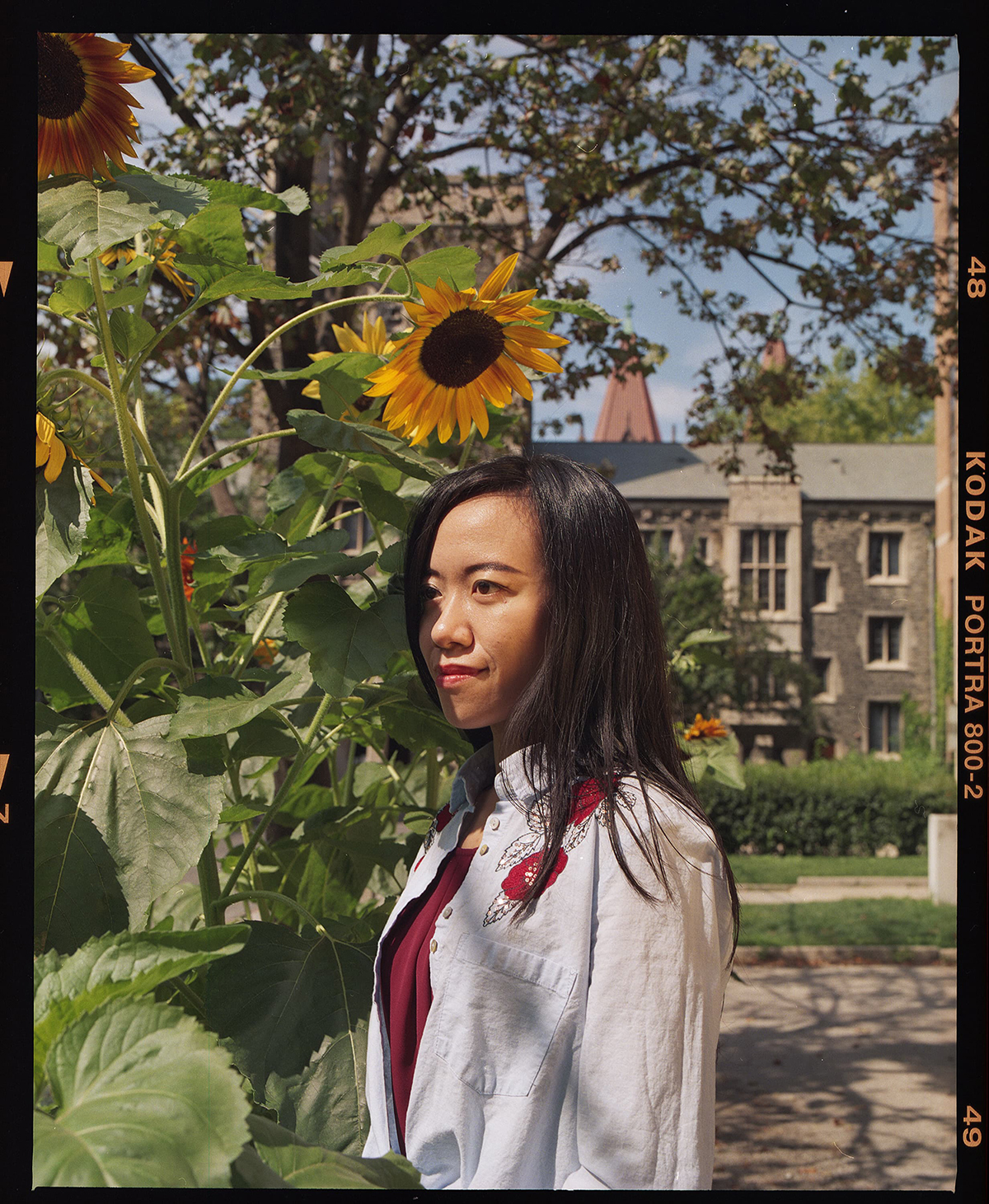



No Responses to “ Come From Away ”
This is great. I have been in Canada just two weeks and it's really amazing how my level of thinking and approach to things have changed. Canada is indeed a peaceful place to study. There are beautiful and creative people everywhere, especially in the Faculty of Music. I grow each and every day both in and out of my area of study. I am glad to be here!
Anne Thackray (MA 1974) writes:
This article revived memories of when I visited U of T in the 1970s to enquire about applying for law school.
I am Canadian. After attending high school in Ontario, I got my first degree (a BA in history) at the University of Cambridge in England. In those days, Canadian students were usually required to obtain a BA in Canada before Cambridge would accept them. But I'd written the entrance exams (required for women applicants to Cambridge), and got in.
The U of T law school official said my academic background was "hazy," and then informed me that the law school didn't need to take students from outside Toronto, let alone outside Ontario,
How times have changed -- for the better.